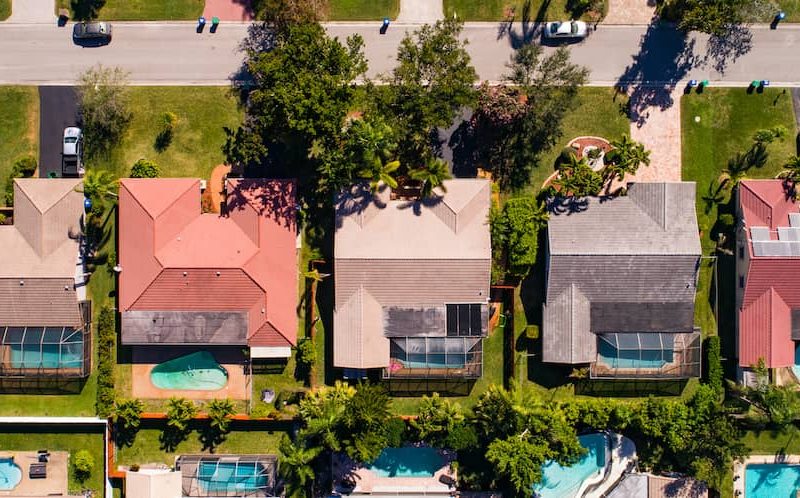Real estate investing is not the same as investing in equities and bonds. With these two marketplaces, you may get started with as little as $100 and exit whenever you choose. But it’s not that simple when it comes to real estate. First, there’s the issue of saving for a down payment, obtaining financing, completing out all of the paperwork, and finally closing. If you want to make money in real estate but can’t bear the thought of saving up all that money and dealing with the buying process, you still have a few options. One of them is real estate wholesaling. So, how can one start real estate wholesaling? Continue reading our beginners’ guide to real estate wholesaling and learn how you can profit from it.
What Is Real Estate Wholesaling?
Real estate wholesaling is the process by which an individual, known as the ‘wholesaler,’ gets a contract from the property’s seller and assigns that contract to an eventual buyer. Wholesaling is regarded as one of the best short-term investment techniques. Wholesaling is an excellent approach for newcomers to start the real estate investing business. This is due to the fact that beginning in wholesaling does not necessitate a large investment. Wholesaling can also assist beginners to learn the real estate market rapidly and build crucial negotiation skills.
A wholesaler can benefit by discovering properties that are being offered for less than market value, reaching a deal with the seller, then transferring the purchase contract to another buyer. They make money by attaching a wholesaling fee to the transaction, which is usually a percentage of the overall property cost. End purchasers are often real estate rehabbers or other investors who do not want to spend time locating and haggling with sellers. Wholesalers make money by acting as a middleman, assisting real estate investors in finding and closing potential agreements. However, there are several aspects to bear in mind to make wholesaling function properly, which will be described further below.
How does Real Estate Wholesaling Work?
Wholesaling real estate is suitable for people who are willing to put in a significant amount of sweat equity. While it is generally risk-free, wholesaling necessitates a significant amount of due diligence and effort in order to provide a decent return. Running a wholesaling business can be difficult since you must be able to find properties that are being offered for far less than market value, make arrangements with sellers, and seek cash buyers who are eager to purchase those properties.
To be successful in wholesaling, you must be willing to put in a lot of time and effort in developing strong lead lists, as well as networking and curating your wholesale buyers list over time. Those that are eager to master the process in such ways will undoubtedly reap the benefits of wholesaling real estate.
Real Estate Wholesaling Example
The premise of wholesaling real estate is straightforward. Assume, for example, that a homeowner is looking to sell. However, the property is in poor condition and thus unlikely to be sold for its full market value—if at all. Rather than rehabilitating the house themselves, the homeowner can sign into a wholesale arrangement with a subsequent investor. Whether the homeowner cannot afford or does not want to make the upgrades, they can choose to engage in a wholesale contract with a wholesaler. The contract grants the wholesaler the right to purchase the property for a certain price (often lower than market value because of the work needed to rehab).
The wholesaler will then find an end buyer ready to spend somewhat more than the wholesaler’s original contract and sell the new investor their rights to purchase the house. Remember that the wholesale is not selling the property itself, but rather the right to purchase it.
5 Easy Steps on How to Start Wholesaling Real Estate
Investors who want to learn how to start wholesaling real estate will be relieved to hear that the procedure is not difficult. Here are a few easy steps to start real estate wholesaling:
- Before you begin, do some research on your local market.
- Create a buyer’s list for your region.
- Find a financing option that works best for you.
- Begin looking for possible wholesaling properties.
- Make a decision on whether to sell the contract or work on a double close.
#1. Do Your Homework
The more prepared you are in the real estate sector, as with anything else, the better. A good place to start is by becoming acquainted with an overview of the process of wholesaling houses in real estate. Then, it is a good idea to undertake proper market research in your area. Get a sense of what property prices are like in your area, where different communities are located, and what types of properties are available. Doing your research today can help you lay a solid foundation for your future wholesale operations.
#2. Begin working on your buyer’s list.
Before investors start looking for their first wholesaling real estate business, it is a good idea to compile a buyer list. Your main job as a wholesaler is to act as a go-between for vendors and buyers. That is why, before putting a property under contract, it is a good idea to know where to find purchasers. Creating a solid buyer list will assist you in determining where to take any bargains you find.
Attending real estate events, networking, email marketing, and social media are all strategies to establish a buyer list. Many prosperous wholesalers also rely on bandit signs, which disseminate your contact information throughout a specific area. Remember, knowing who you’re selling to before you find a deal is in your best interest.
#3. Prepare The Capital
Before you can discover your first wholesale transaction, you must first get funding. Identifying a fantastic property will not benefit your company if you are unable to purchase the contract. To get started, align your services with a private or hard money vendor. As a result, when your first deal comes up, you’ll be able to acquire finance swiftly and easily.
#4. Locate Wholesale Real Estate Opportunities
When you’re ready to start looking for real estate wholesaling deals, you have a few options. Searching for distressed properties in your market area is a good place to start real estate wholesaling. These are ideal since sellers are frequently eager to get rid of the property, and you can typically secure the purchase for less than market value. You can look for distressed properties by searching online real estate sites such as Zillow or Realtor.com, asking your network, or even looking on Craigslist. You can also find distressed properties by exploring local public records. Look for examples where someone has recently inherited a property or when a homeowner has fallen behind on their payments.
#5. Plan Your Exit Strategy
As a real estate wholesaler, there are two ways to profit from a transaction: selling a contract and executing a double closing. Wholesalers that choose to offer a contract simply connect sellers and buyers without ever holding the property and earning from the transaction. This is the most common wholesaling strategy.
Wholesalers can also perform a double closing, which entails physically taking possession of the property. This means that investors will be responsible for all costs associated with closing the property. As a result, investors will only use a double closing if they locate a buyer ready to pay much more for the property. Overall, the best method will be determined by the wholesale deal at hand.
How to Start Wholesaling Real Estate: Beginners Tips
If you want to improve your wholesaling real estate skills, here are a few general guidelines you should follow for beginners:
- To find deals, you must market.
- Networking Is Essential
- Understand Your Numbers
- Convert Leads Into Sales
#1. You Must Market in Order to Find Deals
You don’t have to break the bank to start wholesaling in real estate for beginners, but you do need funds on hand to discover deals. Wholesale deals differ from typical rehab deals in that there is an additional layer involved. There must be enough meat on the bone to persuade an end investor to purchase it from you. To make a profit, you must identify discounts at a low enough price point that everyone can afford. To find bargains, you may need to invest money in marketing.
You don’t have to launch a full-fledged marketing effort, but deals won’t magically fall into your lap. There are a few strategies to search for houses without breaking the cash, including bandit signs, targeted marketing, and social media exposure. Before you begin, you should realize that you will have to spend some money in order to find offers.
#2. Networking Is Essential
You must put yourself out there if you want to be successful in real estate. You need to boost your local exposure whether you are wholesaling, flipping, or shopping for rental homes. This is especially important on the wholesale side of the firm. Good wholesale deals are difficult to come by. Some of the best will come via word of mouth from intimate contacts. Developing those contacts takes time and effort, especially when starting a list of wholesale buyers.
Every networking event or real estate investing club in your area is an opportunity to raise your profile and meet new individuals. The more individuals you know in business, the more likely it is that they will think of you the next time they have a certain deal. You should always have business cards on hand to hand out. Informal settings are frequently where you will make some of your best contacts. Field trips to your children’s school, business projects, and even happy hours at your favorite pub might provide opportunities to discuss real estate. You need as many diverse possibilities as possible to discover decent wholesale deals.
#3. Understand Your Numbers
Most new wholesalers make the error of not fully knowing and understanding the numbers. Consider the wholesale procedure for a moment. You must buy the property at a low enough price that an end investor sees potential. Depending on the property, a list of repairs and charges will most likely be required. If you are not a repair expert, you should delegate that task to a contractor or someone who knows what they are doing. There are also carrying charges that must be paid for as long as the property is owned. After a few months, taxes, insurance, utilities, and other expenses will rapidly add up.
Finally, you should have a notion of what comparable properties in the neighborhood are selling for. Work and upgrades are fantastic, but they may not result in as huge a price increase as you believe. Even if you believe there is a substantial profit, it is possible that it is not what your investors are looking for after all is said and done. You must first understand the numbers before making an offer.
#4. Turn Leads Into Deals
You must, like anything else in real estate, seize opportunities as they present themselves. Getting leads and speaking with homeowners is excellent, but you must convert those leads into sales. You must devote time to learning how to converse with homeowners and what to say when doing so. In most cases, they are selling because you can help them solve a problem. They will most likely sell, whether to you or to someone else. It makes all the difference how you talk to them, answer their queries, and deal with situations.
Having your phone ring nonstop is fantastic, but it won’t help you much if you don’t close sales. Once you’ve closed a few deals, the procedure becomes a lot more doable. You must go through a period of trial and error until you reach that stage. It will take some practice to find the perfect words to say to a homeowner. There will be a few dead ends along the route. Wholesaling will become a lot easier once you have a routine and a way of converting agreements.
How Much Capital Do You Need to Start Wholesaling Real Estate?
Fortunately, you don’t need a lot of money to start wholesaling real estate. You won’t need to take out any loans, and you won’t need to have perfect credit to start real estate wholesaling. However, it is vital that you set aside a marketing budget. As previously stated, marketing is one of the most crucial aspects of wholesaling because it will assist you in finding deals, locating customers, and assigning contracts. When you’re first starting out, use free marketing outlets like Craigslist to spread the word.
If you’re having problems coming up with enough money for an appropriate marketing budget, consider working with a partner. Of course, this means splitting profits, but a partner can bring in much-needed funds as well as knowledge.
What Do Real Estate Wholesalers Get Paid?
The amount of money that real estate wholesalers make is entirely based on their ability to discover the appropriate offer. The goal is to secure a property for less than the investor is willing to pay for it. The greater the difference, the more money you can make. The potential for profit skyrockets as you gain experience and expertise at identifying exceptional offers.
It’s difficult to define an average sale, but it’s not uncommon to make $5,000 to $10,000 each transaction if you discover the perfect bargain. The more money you make, the more transactions you can do, and so forth.
House Flipping vs. Wholesaling Real Estate
There is no perfect answer to the “wholesaling vs. house flipping” issue. Instead, investors must decide what they want to get out of investing and then select the greatest exit plan to move them one step closer to their goal. House flipping, for example, is normally reserved for investors with greater wealth, time, and skill. If nothing else, house flipping is more expensive, takes longer, and is riskier. However, if investors are sufficiently prepared, house flipping can provide more generous returns. In contrast, wholesaling real estate has become synonymous with entry-level methods.
Real estate wholesaling often takes less time to complete, costs investors less money upfront, and decreases risk exposure. As a result, wholesaling provides lower returns.
The decision of whether to wholesale or flip is entirely dependent on the investor’s experience, access to funds, available time, and risk aversion. However, there is no correct or incorrect answer. Each method has the potential to lead to a profitable career. While wholesaling often earns less money per deal, the short time period compensates for lower volume returns. Flipping, on the other hand, will result in fewer transactions but more earnings.
Advantages of Real Estate Wholesaling
- Profits can be made in a shorter period of time.
- Immerse yourself in the real estate industry.
- Suitable for those with limited funds and credit.
Now that we’ve defined wholesale real estate, you’re probably wondering about the advantages of the plan. Continue reading to learn about the top three advantages of property wholesaling:
#1. Earn More Money in Less Time
If you do your homework and educate yourself on the process, wholesaling may be a highly profitable business. Because it needs little to no personal resources or experience, wholesaling is ideal for beginning investors. If your offer is approved, you may be able to finalize the purchase and receive your check-in within 30 to 45 days or less.
Consider this: You make contact with a motivated seller who’s property is estimated to have an after-repair value (ARV) of $125,000. (For further information on calculating ARV, see this page.) Your $100,000 below-market offer is accepted, and you place the property under contract. You find a buyer, asking $115,000, and close the transaction with your own attorney or title firm. This implies you’ve just made $15,000 in a relatively short period of time, and the transaction benefits both you and your customer.
Don’t forget to add your buyer’s information to your buyers’ list since, presuming your initial transaction went well, they may wish to do business with you again in the future.
#2. Research the Real Estate Market
Wholesaling is ideal for beginners since it immerses them completely in the real estate sector in a short amount of time. With the required training and knowledge, you will be able to learn marketing, negotiating, organizing, and obtaining the necessary legal papers. A wholesale deal, in some ways, combines many features of other sorts of real estate deals you may experience during your investing career. With a few wholesale deals under your belt, you’ll know what to look for and what to avoid in offers.
#3. There is no credit involved, and only a small amount of money is required.
If a low credit score or limited access to finance has kept you from investing in real estate, wholesaling is a great option. Because you do not normally acquire the property, you can engage in a wholesale deal even if you have low credit. Instead, you are delegating the purchase contract to an end customer, who is responsible for doing credit checks and funding the transaction. However, there are some disadvantages to investing in wholesale real estate. Next, learn more about the disadvantages.
Disadvantages of Wholesaling Real Estate
- Income might be volatile.It is dependent on finding buyers.
- It can be tough to keep a buyer’s list up to date.
Investors should be aware that any exit strategy will include risks and drawbacks, though the majority of these may be minimized. The following are some drawbacks of wholesale real estate investing that should be carefully considered:
#1. There is no guaranteed income.
Wholesaling isn’t your usual 9-to-5 job. Of course, there are benefits to being your own employer, but you are not promised a paycheck every two weeks. Furthermore, there are no health insurance or retirement benefits associated with wholesaling. As a result, if you want to make real estate investing—particularly wholesaling—your full-time job, you must be the type of person who knows how to manage their finances. If a deal does not go as anticipated, the greatest thing you can do is set aside “rainy day” money.
#2. Difficulty in locating buyers
Having a robust buyer list is essential for being a successful wholesaler. In the world of wholesaling, if there is no buyer, there is no contract. Furthermore, the manner your contract is drafted affects your own risk. If you are unable to locate a buyer, you may be required to return your seller, depending on the amount you put down in escrow. Before making an initial offer to the seller, it is advisable to have a list of possible purchasers ready. As a result, your chances of losing money are significantly reduced. Furthermore, if future purchasers learn that you are unable to close deals, they will be less willing to do business with you.
#3. Maintaining An Organized Buyers List
Keeping an active buyer list is half the fight of running a successful wholesale business. After a few deals, you should have a fairly good list of contacts if you use the correct marketing. However, having such contacts isn’t enough. It is necessary to understand the various tastes of each buyer. If you know “Buyer A” favors turnkey rental properties, you will only contact him if you locate one that fulfills those requirements—that is, a property that will require less work and is in somewhat better condition. If you know “Buyer B” is a rehabber, you should only offer him houses that require extensive construction and are priced far below market value.
Instead of offering every property, you come across to every contact on your buyer’s list, just reach out to individuals you actually believe will find value in that home. You will win loyal customers by remaining on top of your contact list and personalizing your offerings to each individual’s tastes.
Is Real Estate Wholesaling Illegal?
The legality of wholesaling real estate can be a source of contention. Those who allege that wholesale real estate investors are doing business unlawfully do so because they are not licensed, brokers. Wholesalers, on the other hand, are not selling a property in and of itself, but rather the ownership of the real estate contract associated with the property. According to this viewpoint, wholesaling is commonly regarded as a lawful activity. It cannot, however, be overstated that real estate experts should always be well-versed in their local market’s rules and regulations and ensure that their company activities are entirely legal before making any moves of their own.
How to Become a Profitable Wholesale Real Estate Investor
Is wholesale real estate investing something you’d be interested in? The following are the characteristics of a successful wholesale real estate investor:
#1. A learned mindset:
It is possible to argue that successful entrepreneurs lack intrinsic talents or abilities. Successful investors have the correct mindset—one that has been formed through time—and can approach any assignment with consistency and determination.
#2. Make use of technology:
Those who incorporate technology into their workflows are able to handle more information with more accuracy while also being organized. Customer relationship management (CRM) software and mobile applications that allow you to scan and store documents in the cloud are two examples of technologies that might be beneficial to your business. Learn more about how to use real estate software to automate your business.
#3. Have a functional website:
According to the National Association of Realtors, 51 percent of today’s house purchasers find their home on the internet, accounting for the biggest proportion of customers who use the internet to seek goods and services. A strong website helps to develop your brand and authority, which in turn helps to drive more business your way.
#4. Access to reliable neighborhood comps:
A real estate investor’s success is heavily reliant on their ability to find similar house sales in order to price their homes competitively. Furthermore, neighborhood comparisons enable investors to find homes that are being offered for less than market value. Working with a real estate agent who has access to the MLS is one approach to get solid market transaction data.
#5. Know when to outsource or delegate
Astute business owners understand the value of their own time. Juggling daily chores and projects is a constant balancing act and investors who try to do everything on their own risk hurting themselves in the long run. Trying to cram too many events into your day can lead to mistakes, sloppiness, and even missing out on fantastic chances. Understanding whether to outsource or delegate work and projects can be a worthwhile investment.
What are the Common Mistakes that Beginners to Real Estate Wholesaling make?
Most people who want to be real estate wholesalers never complete a transaction. They have assumptions about how the firm operates, are unaware of how much work is required, and perform tasks in an erroneous manner. Here are some examples of errors I’ve noticed:
#1. Uncertainty about what a cash investor will pay
Finding a bargain is the most crucial component of the process. Many novice wholesalers or investors believe that they have a deal simply because they find an FSBO (for sale by the owner) or get a seller to call them back. It makes no difference where you located the property; what counts is the price you can receive for it. No matter how many buyers you have on your list, if you don’t find properties at a reasonable price, none of them will want them.
#2. Taking fake promises at face value
Several wholesalers have contacted me, stating that they will have hundreds of wholesale deals available in the coming months and asking how many I could purchase. They claim to have privileged access to unlisted foreclosures. I never hear from those wholesalers again since wholesalers do not have privileged access to unlisted foreclosures. Deals are earned via hard work, not through gimmicks.
#3. Falsifying the data
Many wholesalers simply make up numbers because they don’t know the real ones or are attempting to create a deal out of something that isn’t a deal. I constantly receive wholesaler agreements with ridiculously low rehab estimates or profit figures that only include the repairs: “Your price $100,000, repairs needed $20,000, ARV $150,000, profit $30,000!” The wholesaler excludes selling charges, carrying fees, closing costs, and potential financing costs.
The investor would almost certainly lose money on this transaction, and the wholesaler appears inexperienced by giving these figures. It is preferable to leave out the profit figure than to try to dupe investors into a deal. The finest wholesalers I know focus on recurring business rather than luring inexperienced investors into disastrous deals over and over.
How to Make the Most of Your Real Estate Wholesaling Profits
If you’ve already established your wholesale business, you might be seeking some pointers on how to maximize your profits. Here are five crucial tips to help you achieve your real estate wholesaling objectives:
#1. Consider the Seller
Remember that one of the primary purposes of wholesale real estate is to contract the property at the lowest possible price. Even if a seller is facing foreclosure, negotiating a reasonable price can be difficult. They may have alternative possibilities, such as other wholesalers or cash buyers. That is why, when creating your presentation, it is critical to put yourself in the shoes of the seller. You can increase your chances of closing a business by thoroughly outlining the wholesaling process and demonstrating that you understand their pain concerns. You won’t want to miss our no-fail script for interacting with motivated sellers if you need further assistance.
#2. Be Open and Honest
Transparency is another important aspect of developing a successful real estate wholesale business. This trait is vital while obtaining wholesale deals because honesty is always the best policy in anything you do as an investor. You will need to clarify your position, associated risks, and ambitions as a wholesaler. Sellers frequently prefer to work with somebody they believe they can trust, regardless of price. This is why it’s critical to respond to queries clearly and completely, even if they don’t like the response.
#3. Have an Exit Plan
An exit strategy describes how an investor intends to exit a deal and how they intend to benefit from it. A typical exit strategy for a wholesaler is to promptly assign contracts to end customers in exchange for a charge for wholesaling.
To do so effectively, wholesalers need to set aside time on a regular basis to create and maintain their wholesale buyer list. The more buyers you have on your list, the more likely it is that you will be able to sell a property. As previously said, many wholesalers build their list by attending networking and investment club meetings, and they keep these ties by learning about each investor’s purchase preferences. Following up on a regular basis is also a terrific method to find out when investors on your list are actively searching to buy.
#4. Maintain All Parties’ Involvement
One of a real estate wholesaler’s tasks is to keep everyone up to date on the status of each transaction. Even though you have a signed contract, you must see it through to its conclusion. This means remaining in touch with the seller while also keeping the final buyer up to date on the status of the transaction. This can be a difficult period for the seller, and they are sure to have many questions along the way. Keeping your sellers and buyers informed and satisfied is more than just good customer service. It’s another opportunity to establish solid relationships that will lead to future repeat business for you.
#5. Post-Closure Follow-Up
Every deal should be considered as an opportunity to grow your real estate wholesaling business. Take the time to contact or plan a meeting after completing a transaction. Too frequently, wholesalers would complete a contract and then leave without debriefing all parties involved. They should wish to work with you again in the future if you accomplished your task appropriately and everyone is satisfied. It only takes a quick email or text message to keep your name fresh in everyone’s mind. Potential deals may be lost if this is not done.
Methods for Closing a Wholesaling Transaction
In wholesale real estate, there are two primary procedures for closing a deal. We’ve already discussed contract assignment, but there’s another option: the double closing (also known as a double escrow). Let’s take a look at the two most common ways to complete a wholesale deal.
#1. Contract Assignment in Real Estate Wholesaling
The most basic method of wholesale real estate is to assign a contract. As the name suggests, assigning a contract entails the wholesaler selling the contract rather than the property. They may not own the land, but they have control over it because to the contract. Following that, once the wholesaler assigns the contract for a subject property, the buyer’s position is acquired by an end buyer.
It is critical to understand that you must execute a contract in order to purchase a subject property during a wholesale arrangement. This is known as a purchase and sale agreement. Furthermore, make certain that the contract does not prohibit you from “assigning” or “selling the contract” to an end customer. All contracts can be sold to another party by default (unless specifically stated otherwise within the contract).
It is crucial to understand that simply assigning a contract does not mean you are selling the property or that your name will appear on the title. You are simply assigning your rights to purchase the home inside the contract and selling those rights to the eventual buyer for a profit. When the buyer is ready to buy the home, ensure that the deposit is delivered to the title agent or attorney who will handle the closing. When the transaction is completed, you are compensated for your role as the “middleman” with a “finders fee.” Of course, this assumes that every requirement of the buy and sale agreement is followed.
#2. Real Estate Wholesaling Double Close
A wholesaler may choose to do a double escrow in specific cases, such as when the seller refuses to consent to an assignment of the contract provision or when it is forbidden by local laws.
A double closing, often known as a “simultaneous closure,” is an equally profitable type of real estate wholesaling. A double closing occurs when an investor buys a property and then resells it at a later date. The resale of the subject property could take place on the same day it was purchased or up to 60 days later, depending on the conditions.
During a double close, your company joins a chain of titles and, for a limited time, is considered the genuine owner of the property. As a result, the seller’s ownership of the property is officially transferred to you (A-B transaction). It is then up to you to find a buyer willing to pay more for the property than you did (B-C transaction). While the process of carrying out a double closing is identical to that of a traditional acquisition, wholesalers should verify with their lender to confirm that this type of transaction is approved.
What resources are available for learning about wholesaling real estate?
There are various online courses, books, and forums dedicated to wholesaling real estate that can help individuals expand their knowledge and skills in this area.
How do you negotiate a wholesale real estate deal?
Successful negotiation in wholesaling real estate requires strong communication skills, knowledge of the market and property, and the ability to reach a mutually beneficial agreement with the seller.
What are the tax implications of wholesaling real estate?
Wholesaling real estate may have tax implications, including income tax, capital gains tax, and self-employment tax. It is important to consult with a tax professional to understand the specific tax implications for your business.
How do you find buyers for your wholesale real estate deals?
Wholesalers can find potential buyers through networking, marketing efforts, or by working with a network of real estate agents and investors.
What are the risks involved in wholesaling real estate?
Some of the risks involved in wholesaling real estate include finding a buyer for the property, difficulty in finding profitable deals, and potential legal issues if the proper procedures are not followed.
How do you build a successful wholesaling real estate business?
Building a successful wholesaling real estate business requires dedication, hard work, and a thorough understanding of the market and industry. It is important to continuously expand your knowledge and skills, network with other professionals, and maintain good relationships with both buyers and sellers.
Summary
Wholesaling real estate is an excellent opportunity for beginners to enter the real estate investing market because it requires little to no cash.
That does not suggest that it would be easy or that the money will be there right away. It takes a lot of work, and it’s easy to get yourself into trouble if you don’t know what you’re doing. You will be able to develop a profitable business if you take your time learning how the business works, learning from others, learning your market, locating buyers, and conducting deals appropriately.
Wholesaling Real Estate FAQ’s
Do you need money to wholesale real estate?
There is no need for credit or money. The only thing you really need to do when wholesaling properties is identify an assignee for a certain property — that’s half the battle. You must be able to advertise the appropriate property to the appropriate person.
Is wholesaling real estate legal?
It is lawful to wholesale real estate as long as you obey the laws of your specific state. Having stated that, there are several circumstances that make wholesaling illegal. Investors, in particular, cannot bring the buyer to the sale first, proceed without a transparent contract, or fail to demonstrate purpose.
Do you pay taxes on wholesaling real estate?
Real estate agents, flippers, and wholesalers are liable to a 15.3 percent self-employment tax on their earnings.
Related Articles
- Commercial Real Estate: Definition, Types, Companies & Best Investment Tips
- Real Estate Industry: Overview, Types & Examples
- Real Estate Trends: Comprehensive Market Trends 2023
- Purchase Agreement: Real Estate Buy and Sell Contract
- Door Knocking: Best 2023 Real Estate Practices (+ Free Script Strategies)
- WHOLESALE REAL ESTATE CONTRACT: Understanding Wholesale Real Estate Contract






